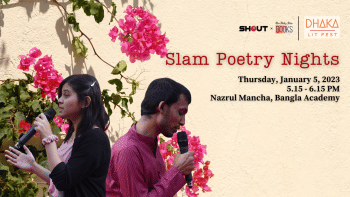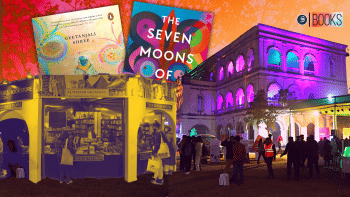Defining Haiku poetry with poet Quamrul Hassan

Haiku is a form of Japanese poetry which originated in 13th century Japan. Later, the form was mastered by the 17th century Japanese haiku master, Matsuo Basho. There are currently multiple international haiku societies and quarterly publications that research and publish haiku written by modern poets. In Bangladesh, poet Quamrul Hassan is well known for his haiku, both nationally and internationally. Both of his books, Spring Moon (2011) and Hyaku Haiku (2016), have been critically acclaimed, with the former being the first book of English haiku penned by a Bangladeshi.
Quamrul Hassan conducted a workshop on haiku writing at the Dhaka Lit Fest with a view to familiarise Bangladeshi readers with the form. We spoke with him about the poetry and its inspirations.
You have been writing haiku for 18 years. How do you define a haiku?
To me haiku is a poem in three lines that captures the image of a single moment in the reader's mind. It is not about expressing everything in three lines. You have to capture a moment and then leave things up to the reader [for interpretation].
Your book Hyaku Haiku is a collection of 100 haiku. Why did you choose this particular title?
In Japanese, the word 'hyaku' means hundred. I wanted to give the title a little Japanese essence, hence, Hyaku Haiku.
Can we talk about the reprinting aspect of your second book? It was published by Hassan's in 2021. Is there any specific reason behind self-publishing?
When I was trying to get it published for the first time, I went to one of the top publishers of Bangladesh. But for some reason that equation did not work. So I decided to self publish. My first book, Spring Moon, was also self-published. Amrita Hassan and I are the cofounders of Hassan's Publishers. Since its beginning in 2020, Hassan's has published around 12 books till date. Our first book was Ten Square, a collection of 100-word stories written by 100 Bangladeshi writers. In 2022, we also published Aisha H. Shams' poetry collection, As Long As Yesterday.
In the foreword of Hyaku Haiku, you mention that, "Writing haiku gave me an identity…" and you also expressed that haiku should be taught at universities. Tell us more about this.
My journey with haiku started in 2004. The daily newspaper, New Age was founded. My professor, Niaz Zaman, happened to be the literary editor of New Age at the time. Niaz Ma'am called for haiku entries and mentioned the rules of writing haiku. I was a student of the English Department at Dhaka University then.
I followed the rules, wrote a haiku, and submitted it. Finally, among multiple entries, 10 were published. Mine was one of them. Since then, I have been on this journey of haiku writing. I have met many experts and well-wishers along the way. Their support and criticism have helped me blossom as a Bangladeshi haiku poet today. I want to do the same for others. I want to promote haiku in Bangladesh through talks and workshops so that people take interest in it.
Where do you think Bangladesh stands among other South Asian countries that also write haiku?
I think haiku is an unexplored niche in Bangladesh. It has become a great literary phenomenon in India. Every two years, our Indian friends arrange international haiku festivals. Poets from around the world participate there. Indian poet Kala Ramesh is doing a commendable job in this area. I always encourage other Bangladeshi poets to attend these festivals. We need more haiku enthusiasts from Bangladesh to turn it into something significant.
You have attended a number of Slam Poetry Nights sessions organised by SHOUT and DS Books. As a poet, what are your observations about the young poets of Bangladesh?
I loved the Slam Poetry Nights—not only because of the poems, but also because of the feedback the audience shared. These interactions help us to know the poet better, in my humble opinion. Slam Poetry is a unique event, a platform for the young Bangladeshi poets for sharing their work. I hope to attend these sessions regularly.
Do you have any words of advice for young poets and haiku enthusiasts?
QH: The key for achieving anything is sincerity, motivation and determination. Do not give up, always keep trying. Receiving feedback from critics and continuous improvement of your work is necessary. For haiku enthusiasts, follow the international haiku journals such as Frogpond, The Heron's Nest, and Triveni Haikai India regularly. Triveni has an initiative of providing weekly haiku prompts which is very useful. You can also submit your work at the monthly Kukai contests run by The Haiku Foundation.
Maliha Huq teaches English at DPS STS School, Dhaka.

 For all latest news, follow The Daily Star's Google News channel.
For all latest news, follow The Daily Star's Google News channel. 







Comments